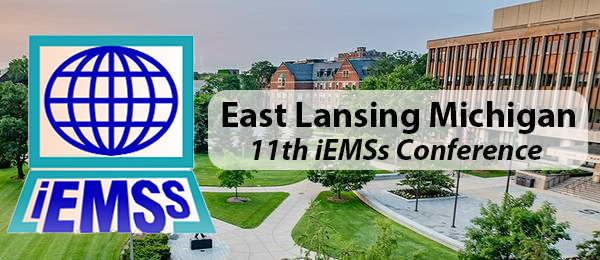| 2022 |
| Tuesday, July 5th |
|
1:40 PM
|
Recalibrating an agent-based model of global food and nutrition
trade
Nick Roxburgh, James Hutton Institute,
Gary Polhill, James Hutton Institute,
Jiaqi Ge, University of Leeds
1:40 PM - 2:00 PM
|
|
2:00 PM
|
Characterizing modeling contexts to support adequate and valid
model choice
Christian Troost, University of Hohenheim
Thomas Berger, University of Hohenheim
2:00 PM - 2:20 PM
|
|
2:20 PM
|
Experiences from using behavioural economic methods to
parameterize an ABM simulating the adoption of sustainable
farming practices
Robert Huber, Agricultural Economics and Policy AECP, ETH Zürich
Cordelia Kreft, Agricultural Economics and Policy AECP, ETH Zürich
Karin Späti, Agricultural Economics and Policy AECP, ETH Zürich
Robert Finger, Agricultural Economics and Policy AECP, ETH Zürich
2:20 PM - 2:40 PM
|
|
2:40 PM
|
Participatory methods for parameterization and validation of agentbased
models – The case of AgriPoliS
Franziska Appel, Leibniz Institute of Agricultural Development in Transition Economies (IAMO)
2:40 PM - 3:00 PM
|
|
3:00 PM
|
Deriving trajectories from videos to calibrate and validate agentbased
models
Judith Verstegen, Wageningen University,
Anna Formaniuk, University of Münster
Benjamin Karic, University of Münster
Lars Haalck, University of Münster
3:00 PM - 3:20 PM
|
| Wednesday, July 6th |
|
1:40 PM
|
Combining filter and embedded approaches to improve variable
selection in land use change Cellular Automata models using
Random Forests.
Benjamin Black, ETH Zurich, Planning of Landscape and Urban Systems PLUS, HIL H 52.1, Stefano-Franscini-Platz 5, CH-
8093 Zürich, Switzerland,
Adrienne Grêt-Regamey, ETH Zurich, Planning of Landscape and Urban Systems PLUS, HIL H 51.3,
Stefano-Franscini-Platz 5, CH-8093 Zürich, Switzerland
1:40 PM - 2:00 PM
|
|
2:00 PM
|
Introducing PyBySTE: A Python package for Source Term Estimation
using Bayesian Inference
Piotr Kopka, National Centre for Nuclear Research,
Anna Wawrzyńczak-Szaban, National Centre for Nuclear Research, Siedlce University of Natural Sciences and Humanities
Sławomir Potempski, National Centre for Nuclear Research,
2:00 PM - 2:20 PM
|
|
2:20 PM
|
A Myriad of Motivations: how modelling decisions are made
Janneke Remmers, Wageningen University
Ryan Teuling, Wageningen University
Lieke Melsen, Wageningen University
2:20 PM - 2:40 PM
|
| Thursday, July 7th |
|
7:20 AM
|
Application of generic model components for environmental policyanalysis
Jean-Luc de Kok, Flemish Institute for Technological Research (VITO),
Peter Viaene, Flemish Institute for Technological Research (VITO),
Erika Palmer, SINTEF Ocean AS
7:20 AM - 7:40 AM
|
|
7:40 AM
|
A framework to ensure scenario-neutral climate impact assessments
better align with scenario-led projections
Sam Culley, University of Adelaide
Holger R. Maier, University of Adelaide
Seth Westra, University of Adelaide
Bree Bennett, University of Adelaide
7:40 AM - 8:00 AM
|
|
8:00 AM
|
We Maintain the Status Quo in Modelling
Lieke Melsen, Wageningen University, Wageningen, The Netherlands
8:00 AM - 8:20 AM
|
|
12:00 PM
|
ADRIA: A guidance system for intervention research, development
and deployment on coral reefs under uncertainty
Takuya Iwanaga, Institute for Water Futures, The Australian National University,
Ken Anthony, Australian Institute of Marine Science,
Rose Crocker, Australian Institute of Marine Science,
Veronique Lago, Australian Institute of Marine Science,
12:00 PM - 12:20 PM
|
|
12:20 PM
|
A framework and system dynamics modelling approach for
performing viability assessments of bio-methane projects in newly
adopting countries
Sam Culley, University of Adelaide
Holger R. Maier, University of Adelaide
Aaron Zecchin, University of Adelaide
Jing Tian
12:20 PM - 12:40 PM
|
|
12:40 PM
|
Impact of Ethical Premises on Pareto-Optimal Climate Abatement
Pathways
Max Reddel, Delft University of Technology
Palok Biswas, Delft University of Technology
Jazmin Zatarain Salazar, Delft University of Technology
Jan Kwakkel, Delft University of Technology
12:40 PM - 1:00 PM
|
|
1:40 PM
|
Improved Understanding of the Relationship between ModelComplexity and Calibration Performance using ExploratoryLandscape Analysis Metrics
Siwei Zhu, School of Civil, Environmental and Mining Engineering, University of Adelaide, Adelaide, South Australia,5005
Holger R. Maier, School of Civil, Environmental and Mining Engineering, University of Adelaide, Adelaide, South Australia,5005
Aaron Zecchin, School of Civil, Environmental and Mining Engineering, University of Adelaide, Adelaide, South Australia,5005
1:40 PM - 2:00 PM
|
|
2:00 PM
|
Finding Diverse Future Scenarios for Complex Systems
Patrick Steinmann, Biometris, Wageningen University Research, the Netherlands,
Judith Verstegen, Laboratory of Geo-information Science
and Remote Sensing, Wageningen University Research, the Netherlands,
George van Voorn, Biometris, Wageningen University Research, the Netherlands,
Arend Ligtenberg, Laboratory of Geo-information Science
and Remote Sensing, Wageningen University Research, the Netherlands,
2:00 PM - 2:20 PM
|
|
2:20 PM
|
Designing a knowledge system for managing deep uncertainty?
Joseph Guillaume, Institute for Water Futures and Fenner School of Environment Society, The Australian National University,
Canberra, Australia
2:20 PM - 2:40 PM
|
|
2:40 PM
|
Cooperative adaptive climate policies: an application of the EMODPS
algorithm to deal with multiple objectives and deep uncertainty in
the RICE50+ integrated assessment model
Angelo Carlino, Politecnico di Milano,
Paolo Gazzotti, Politecnico di Milano, EIEE
Massimo Tavoni, Politecnico di Milano, EIEE
Andrea Castelletti, Politecnico di Milano, EIEE
2:40 PM - 3:00 PM
|


